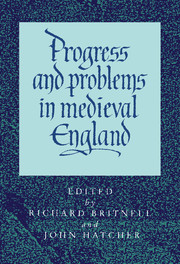Book contents
- Frontmatter
- Contents
- List of figures
- List of maps
- List of tables
- List of contributors
- Edward Miller: an appreciation
- List of abbreviations
- 1 Economic development in the early twelfth century
- 2 Lothian and beyond: the economy of the ‘English empire’ of David I
- 3 Boroughs, markets and trade in northern England, 1000–1216
- 4 Peasant deer poachers in the medieval forest
- 5 The growth of London in the medieval English economy
- 6 The bankruptcy of the Scali of Florence in England, 1326–1328
- 7 The English export trade in cloth in the fourteenth century
- 8 A medieval tax haven: Berwick upon Tweed and the English crown: 1333–1461
- 9 Taxation and communities in late medieval England
- 10 Peasants and the collapse of the manorial economy on some Ramsey Abbey estates
- 11 The famuli in the later Middle Ages
- 12 The great slump of the mid-fifteenth century
- 13 Lorenzo de' Medici's London branch
- 14 The trade of late medieval Chester, 1500–1550
- Bibliography of Edward Miller's published works
10 - Peasants and the collapse of the manorial economy on some Ramsey Abbey estates
Published online by Cambridge University Press: 05 June 2012
- Frontmatter
- Contents
- List of figures
- List of maps
- List of tables
- List of contributors
- Edward Miller: an appreciation
- List of abbreviations
- 1 Economic development in the early twelfth century
- 2 Lothian and beyond: the economy of the ‘English empire’ of David I
- 3 Boroughs, markets and trade in northern England, 1000–1216
- 4 Peasant deer poachers in the medieval forest
- 5 The growth of London in the medieval English economy
- 6 The bankruptcy of the Scali of Florence in England, 1326–1328
- 7 The English export trade in cloth in the fourteenth century
- 8 A medieval tax haven: Berwick upon Tweed and the English crown: 1333–1461
- 9 Taxation and communities in late medieval England
- 10 Peasants and the collapse of the manorial economy on some Ramsey Abbey estates
- 11 The famuli in the later Middle Ages
- 12 The great slump of the mid-fifteenth century
- 13 Lorenzo de' Medici's London branch
- 14 The trade of late medieval Chester, 1500–1550
- Bibliography of Edward Miller's published works
Summary
For economic historians the end to the age of serfdom has usually been associated with the collapse of the direct exploitation of the demense around 1400 along with the fleeing and eventual disappearance of serfs and serfdom. However, recent scholarship has found it increasingly difficult to obtain a clear picture of the rationale behind the lord's decisions at this time. Could it be that peasant tenant decisions were more operative in these changes than we have hitherto acknowledged? Certainly, major advances in the study of tenants over the hundred years after the Black Death now point in this direction. This essay attempts to add focus to such research.
In a forthcoming study entitled Peasant Economic Development within the English Manorial System, it has been possible to trace the economic role of main customary tenants on some estates of Ramsey Abbey over the greater part of the fourteenth century. This study will carry the investigation one step farther and present the decision-making structure involving main customary tenants during the collapse of some Ramsey manorial economies around 1400.
The general features of the methodology employed for this study will not be surprising in so far as the investigation will reveal further examples of interplay between uniformities and the breakdown of uniformities. The major tradition of manorial studies that began some hundred years ago was especially attracted by manorial customaries from the thirteenth century where, as today with accounting practices, uniformity was the primary organisational principle.
- Type
- Chapter
- Information
- Progress and Problems in Medieval EnglandEssays in Honour of Edward Miller, pp. 191 - 206Publisher: Cambridge University PressPrint publication year: 1996



